

| NEWSLETTER |
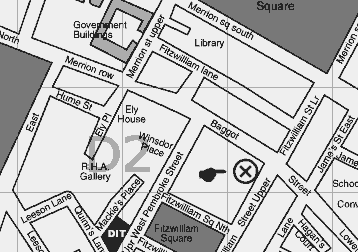

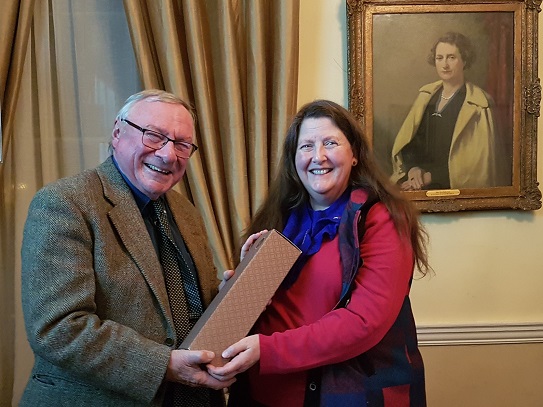
In some respects Xi Jin Ping’s New Silk
Road harks back to Deng Xiao Ping’s drive
for increased prosperity in the 1980s but
it follows an opposite tendency to Deng’s
wish for China to hide her strength and
never to claim leadership in the world. By
contrast, Xi wants the country to take a
lead in bringing stability to unstable
regions and looks forward to the Chinese
people making a greater contribution to
humanity. Maybe China was just biding her
time as it is now propitious for such
ambitious plans, given the surplus
capacity in the Chinese economy and a need
for infrastructural development as well as
the abiding political imperative to
reverse the humiliation of the Middle
Kingdom’s colonial occupations in recent
centuries. Going West also holds out the
prospect of avoiding the middle income
trap(i.e. it facilitates a move away from
an economy based on cheap labour to one
based on higher value, more innovative
products) and a damaging focus on
competing with the US.
In such a grand scale project it is
impossible to please everybody. Criticisms
from other countries centre around the
unviability of products, opacity in the
planning process and the sino-centric
nature of the initiative. Russia and
India, for example, are critical of being
bypassed although the Russian concerns
have been addressed, at least in part.
There are other pressures to deal with, apart altogether from the non-committal stance of countries lying outside its scope like Japan and South Korea: demands for reciprocity and European worries, the French Government’s in particular, as concerns increase over the potential for Chinese dumping of cheap products to undermine local industry. Nonetheless, the desire for infrastructural development which the Belt and Road Initiative brings with it makes it welcome in many countries and invites comparisons with the Marshall Plan after World War 2 but it is 10 times larger in scale.
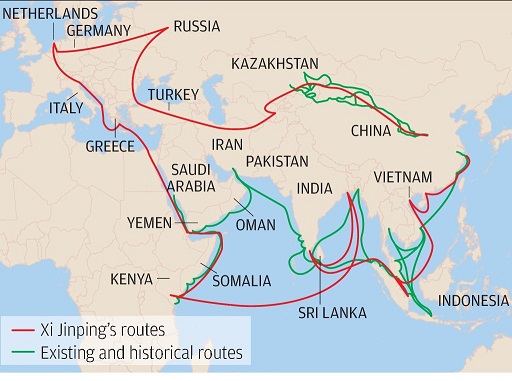
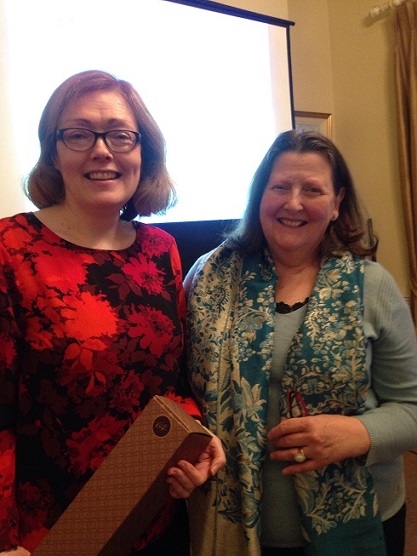
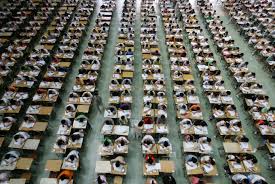
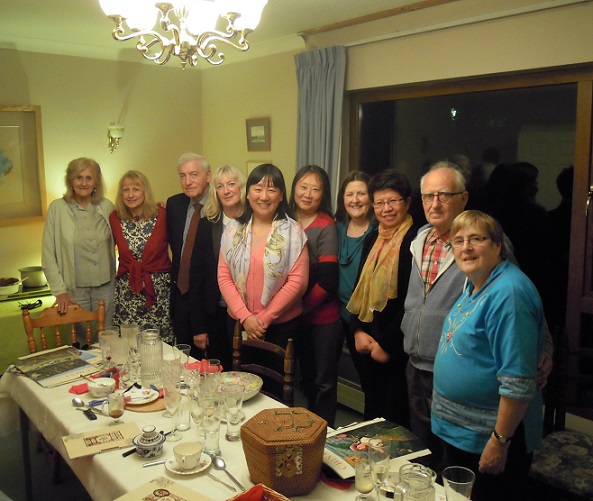
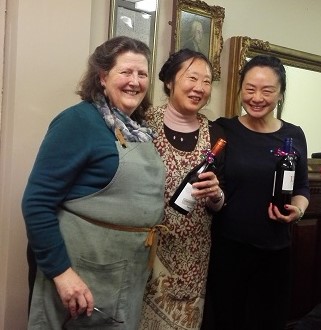 |
Debbie, Shu Rong
and Yanyi
orchestrated
affairs as we all
enjoyed a
wonderful gourmet
evening in Wesley
House. The menu
included Yuk Sung
Chinese Lettuce
Wraps,
Cantonese-style
Prawns with crispy
garlic, Whiskey
Spare Ribs,
stir-fried Chinese
Cabbage and
Sichuan Rice
Noodles with
Leeks.
|
||
| We began by being tutored to roll out our glutinous rice balls and they reappeared as an ingredient in the dessert which was as delicious as the title sounds: Rice Wine with Glutinous Rice Balls, Pumpkins and Coconut Milk. The texture was reminiscent of drinking Bubble Tea with a twist of sweetness! | |||
| . | 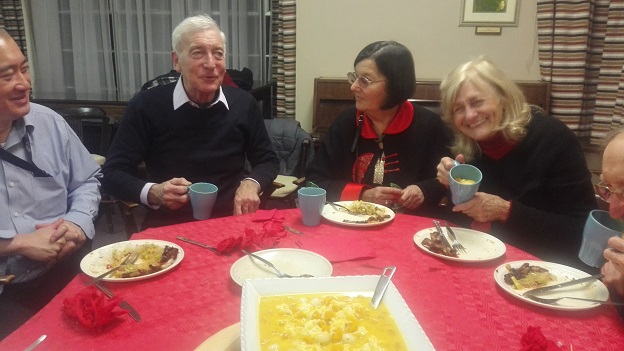 |
|
|
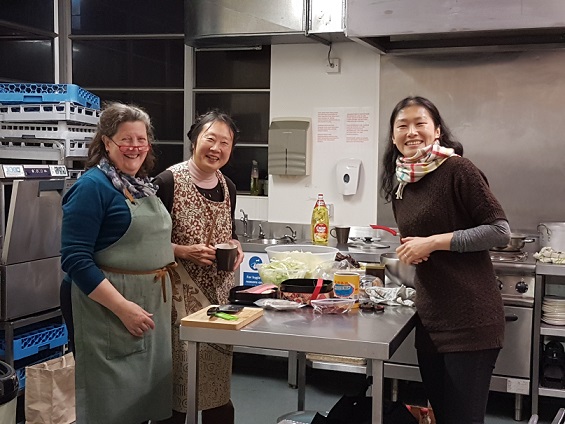
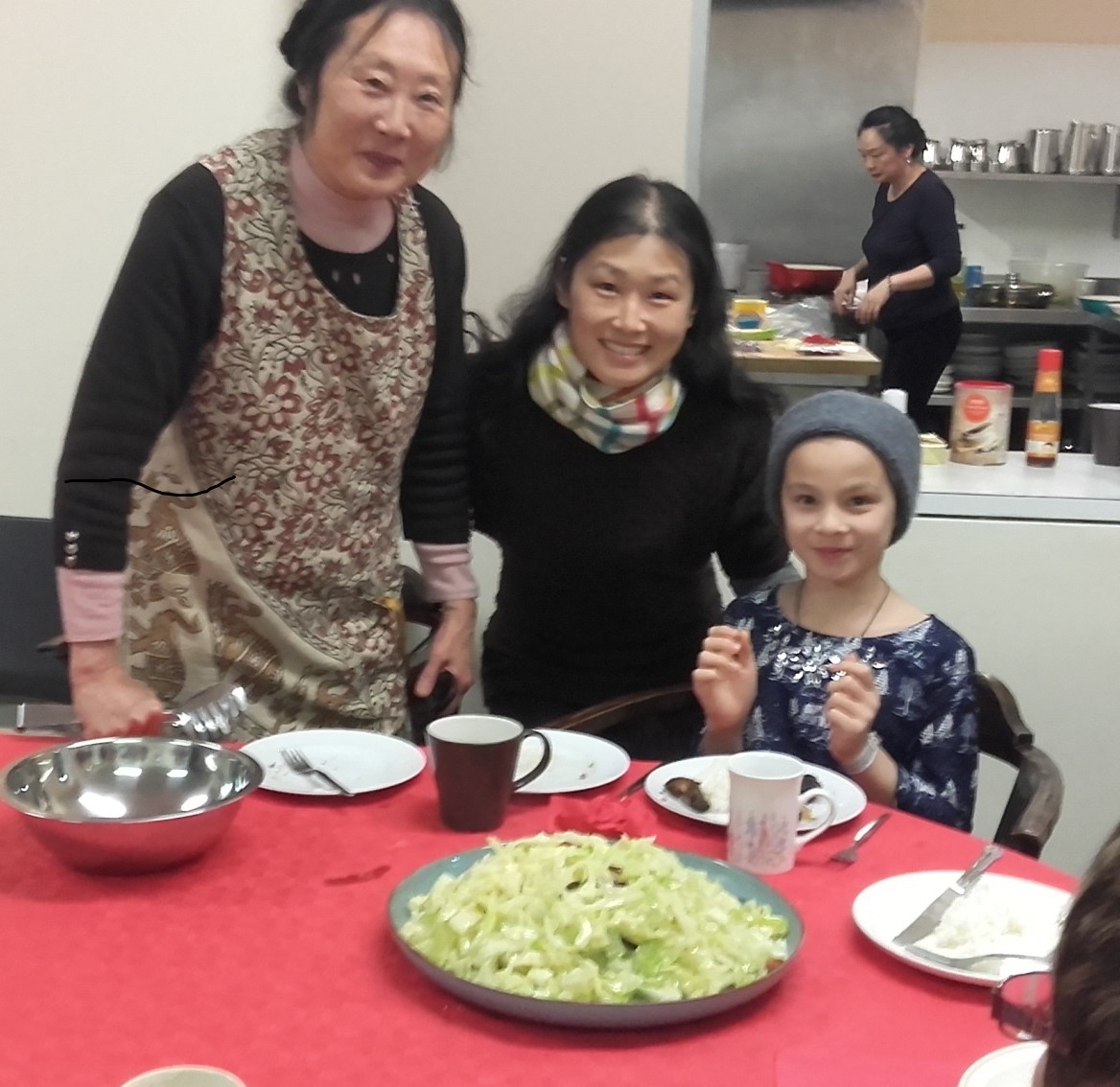
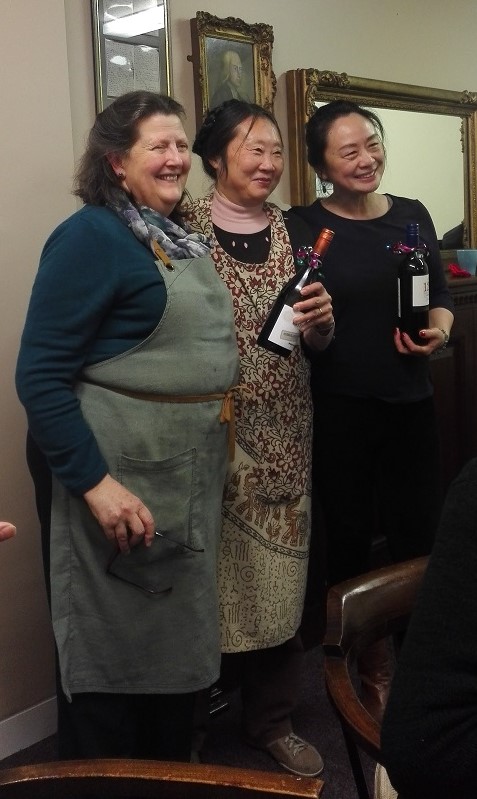
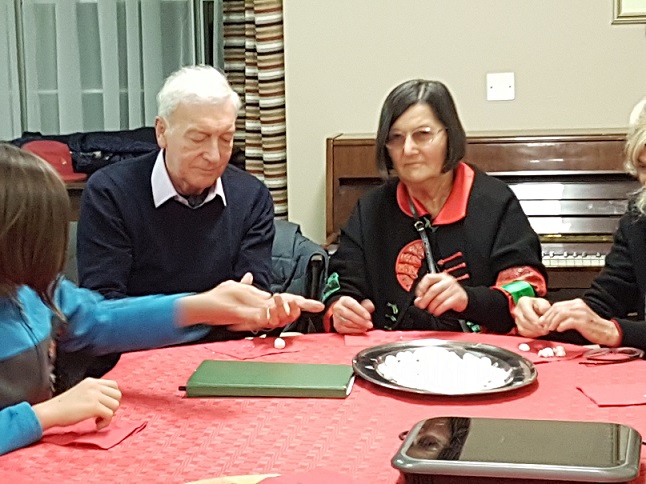
We were not to
know that the
night would be
overshadowed
by the
untimely
passing of
Nora Mc Dowell
so soon
afterwards. A
special
tribute to her
as a person
and to her
work for the
Irish Chinese
Cultural
Society
accompanines
this
newsletter.
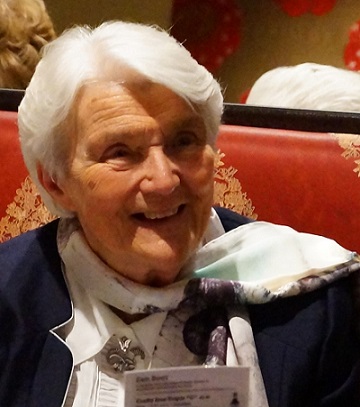
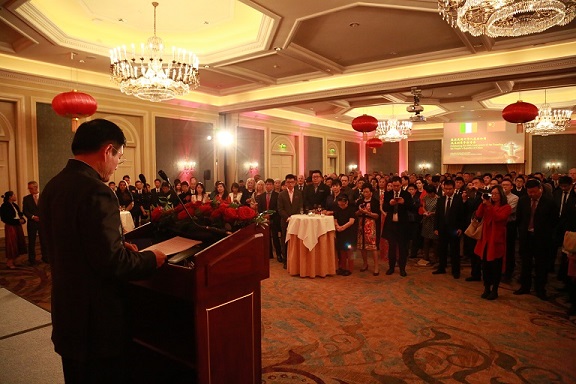
In his speech, Ambassador Yue spoke very highly of the growth and expansion of China-Ireland relations, a prime example being the plan to introduce Mandarin as a Leaving Certifiicate subject for students entering 5th Year in 2020 with the first sitting of the exam due to take place in 2022.

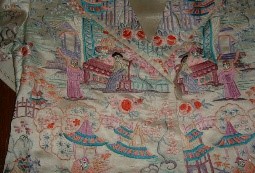
My aunt told me this jacket which my grandmother wore to play bridge, dates from the mid-1930s. It is embroidered with a special type of silk thread called perlé wherein the fibres are twisted in such a way as to resemble tiny beads or, in French “perles”. The techniques involve satin stitch, voiding and there is some shading. It is typical of the work done for fashionable Chinese ladies in cities like Shanghai and Hong Kong, or indeed, for the export market.
I am unfamiliar with the stories depicted here, but, as the detail of the front of the jacket shows, there are social meetings, in pavilions, people walking or on journeys, all in garden scenes with exquisite blossoms. In the detail of the back of the jacket, the images are more wistful…of a lonely girl, perhaps dreaming of a lover (a phoenix is flying nearby) or engrossed in the scenery, showing more railings, streams and blossoms which stretch across the whole of the garment.
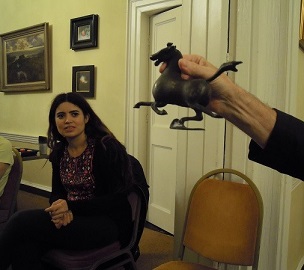
This remarkable bronze flying horse was the cover photograph for the catalogue of 'The Genius of China' exhibition that was staged in the Royal Academy, London in the Autumn of 1973, and which I was fortunate enough to attend.
This breath-taking exhibition of nearly 400 archaeological finds from The Peoples Republic of China was probably the first time most people in the West had seen these objects. It was also the first such major exhibition sent abroad from China after the turmoil of The Cultural Revolution.The 'Flying Horse' dates from the 2nd Century AD, during the Eastern Han Dynasty and measures 24cm in height and 45cm in length. While galloping across the sky, one of its hind-legs touches a swallow, who turns its head around in surprise. The horse is neighing, with a slight tilt of its head. The horse conveys a wonderful sense of activity in a most natural way, and I was captivated to see it.
About a decade later in the mid-1980's, while on a visit to China, I saw a replica of the Flying Horse for sale, and promptly bought one. It is about half the size of the original Horse seen at the Royal Academy, but is cast in bronze like the original.It is one of my favourite possessions, and always reminds me of memorable visits to China.
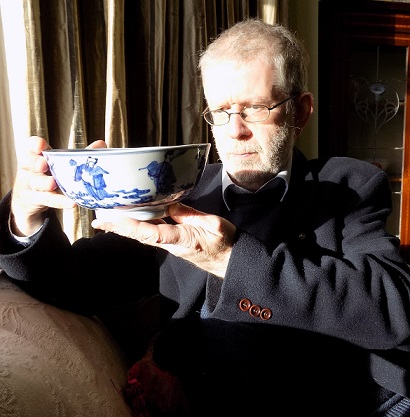
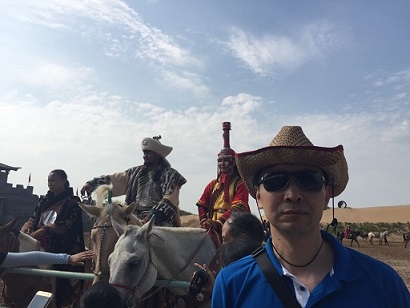

It was hard to believe. At our Wesley House meeting of Wednesday December 6th, Nora was in sparkling form: happy that she was back in her own home after a couple of months in medical care. On Friday morning she was dead. ICCS members had lost a much-loved friend, and the Society a valued committee member.
Nora Murphy was born on 24 June 1930. She grew up in Clones Co. Monaghan, where her father, Baldwin Murphy, was a solicitor, like his father and grandfather before him. She always spoke of Clones with great affection. She studied in UCD, and then qualified as a solicitor. She took a job in the firm of McCann White and FitzGerald. It did not last long - one of the partners, John L (Jack) McDowell, asked her to be his wife, and they were married on 22 October 1955. Jack's health was always a subject of concern. He had had a long battle with TB, including a spell in an English sanatorium (where one of his fellow-patients was Noel Browne, later Minister for Health). In spite of this, and an age difference of 22 years, they had 32 happy years together, with a family of three boys. No one who has experienced her warm hospitality will be surprised to learn that over the years she became something of a social hub for her adopted Mc Dowell family, and filled a similar role in her own Murphy family.
Nora's great spirit kept her from buckling under the blow of Jack's death on their wedding anniversary in 1987. She threw herself into a host of activities, with travel prominent among them. (No account of her life would be complete without mentioning an incident during a trip to India with Jane Almqvist. They were riding on an elephant on a jungle safari when a tiger charged them, slashing the elephant’s side with its claws. The mahout was sure that it was just a false charge, to frighten them away from the vicinity of her cubs: but neither Nora, nor Jane, nor least of all the elephant, shared this insight. In spite of the terror, Nora managed to take a photo of the tiger, inches away from her.) In 1988,she joined what is now called the Dublin Zoo Volunteer Programme, just one year after its inception. She worked with Meals on Wheels, played Bridge, and was a moving force in the Active Retirement Group in Rathgar. And, of course, joined the ICCS: where she served as Vice-President, and as Secretary for two three-year terms, and was a most valuable Committee member. She hosted the meetings of the Committee in her house for many years.
In March 2001 Nora and Mary Neville (like Jane Almqvist, another Zoo Volunteer) gave the ICCS a marvellous joint talk with the memorable title "A Whiz through China", describing with great good humour their "classic" trip to China in September 2000. In 2002, Nora travelled to China again, as a self-paying member with the ICCS delegation to Youxie, the Chinese People's Association for Friendship with Foreign Countries; a wonderful visit organised by Youxie in conjunction with our then President, Professor Sun Dawen. A highlight was when Dawen, an internationally renowned UCD professor of food engineering, who had been fêted and honoured in his home city of Chaozhou, brought us to his brother's house. (Realising from this how highly a visit to a private house is appreciated is probably what prompted Nora in 2011 to organise a dinner in her Rathmines home for a delegation from Youxie. This was also the first social engagement of Ambassador Luo Linquan and his wife Qiao Li after taking up their appointment here. The occasion could almost be described as riotous, such was the fun and hilarity had by all, and left the Chinese with a wonderful sense of an Irish welcome.) At the end of the official programme, our group split up, and Nora and Jane went off on their own on a silk-and-embroidery-centred trip to the Suzhou region.
Nora took people as she found them, in a completely non-judgemental way. But if somebody was acting a bit above himself, Nora, with her great sense of humour, could politely make her underawedness known. She was a wonderful companion, and will be hugely missed. To her three sons Lonan, John and Mark, and their families, we extend our deepest sympathy.